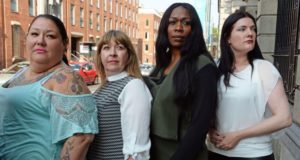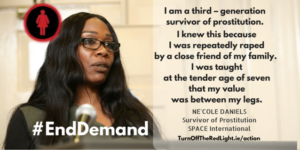Listening to the voices of those who have survived any form of oppression is crucial as the truest way to get to the heart of that which has been survived’.
-Rachel Moran, SPACE International
Survivor leadership has been critical to the TORL campaign, demonstrating strength, courage and activism. The natural authority and breadth of first-hand experience of survivors makes survivor activism a powerful mechanism for change. Survivors of the sex trade, and those still effected by it, were central to TORL with many taking an active part. Their voices were further supported by the participation of frontline services, working with those affected by the sex trade, who were not in a position to publically advocate or campaign themselves.
The issues of sex trafficking and exploitation within the commercial sex trade in Ireland is invisible to many, as it is mainly indoors. The campaign want to ensure that any visuals or representation of those effected was communicated directly by survivors or influence and informed by same. The campaign was coordinated by a core group with representation from Space International and survivor activists Mia De Faoite. Both were powerful advocates for the campaign. We were fortunate to have a strong survivor activist voice to inform and persuade key decision makers. We also had their expertise and knowledge, as expert witnesses, to inform any visuals or representation designed and used by the campaign.
Challenging popular misconceptions about prostitution is key to the campaign’s work. Members of the public, both in Ireland and abroad, often have a limited understanding of prostitution, the effect it can have on individuals, society and its connection to organised crime. Given this lack of understanding, by drawing on the lived experience of prostitution and sex trafficking, survivors continue to influence decision-makers, raising awareness of the challenges facing survivors. With the participation of survivors, TORL gained the attention of policy makers and legislators, raising awareness of the experiences, needs and demands of women who have experienced prostitution and trafficking. A key moment in boosting political support was a decision to bring the voices of survivors to the attention of politicians and key legislators who were visibly affected by their testimony.
The campaign strove to be a safe forum for survivors to share their experiences, shape the conversation among the public and policy makers, and guide supporters towards actions they could take to support efforts against sexual exploitation and trafficking. With survivor activists, TORL mobilised and called on legislators to ensure that victims are adequately supported, while those fuelling trafficking and exploitation are held accountable.
Survivor participation and witness:
A key moment early in the campaign, in boosting political support was a decision to bring the voices of survivors to the attention of politicians. A packed briefing galvanised support, most notably male politicians were swayed by the authentic voices of survivors. The survivors outlined the reality of the sex trade in Ireland, the impact on their lives and the difference they believe the proposed legislation would make.
Later at another crucial point, Representatives from Space International (http://www.spaceintl.org/) present their experience of the trade to key opinion formers in Ireland.
Rachel Moran, a survivor of prostitution from Ireland, looks towards the Dáil to pass the Sexual Offences Bill, to criminalise the purchase of sex and recognise prostitution and sex trafficking as violence against women. She was joined yesterday at Leinster House by other brave survivor/activists from SPACE International: Bridget Perrier (Canada), Fiona Broadfoot (UK), and Ne’cole Daniels (USA), who shared their testimonies of survival and called for the Irish government to make the Sexual Offences Bill an urgent priority.

Bridget Perrier, Fiona Broadfoot, Ne’cole Daniels and Rachel Moran, who gave testimonies about having survived prostitution, at the launch of the Turn Off The Red Light campaign at Leinster House on Wednesday. Photograph: Eric Luke
To further communicate this voice, we communicated key comments and quotes from the women, through social media.
Images and representation:
From the outset, it was agreed that there must be a balance struck between representing the experiences of abuse and vulnerability in sex trafficking, and the need to avoid showing those affected as weak or victi ms. Therefore, images and statements were chosen where possible to contrast the inner strength of the women affected and the stark reality of their experiences.
ms. Therefore, images and statements were chosen where possible to contrast the inner strength of the women affected and the stark reality of their experiences.
Making direct eye contact with the camera, and thus the viewer, we aimed to challenge audiences to reflect on the reality of what too many women, children and men were going through in Ireland.
Branding for the campaign put women at its centre, and chose colours that reflected its serious nature: red and black.
Being a Survivor involved in Campaigning for Change – Mia De Faoite

I exited prostitution with the help of a social worker in October 2010. After about a year I was in a very different place, a good place but as hard as I tied I could not forget the friends I had left behind, I could not forget what I had witnessed and the memories of what had been done to my own body still haunted me.
In May of 2012 I went to a screening of a documentary called ‘The Price of Sex’, after it was shown, there was a panel discussion and it was the first time I heard Denise Charlton, Chair of the TORL campaign speaks. Afterwards I approached her to thank her, I told her that I had left prostitution not long ago but I never knew that women like her existed; I didn’t know that there were people out there fighting to end this suffering. She asked me if I would like to add my voice to the campaign and gave me her number. I called a few weeks later, and therein my search for justice began by the telling of my own story because justice evolves out of recognition.
For the first ten months I did not speak publicly nor was there any demands made on me to do so. I had to figure out what I wanted to say, how I would say it and who I would say it to first. I had a very supportive team beside me and any questions or concerns I had I could reach out to them. I wrote a submission to the Justice Committee, finally putting my experiences and thoughts down on paper was in itself therapeutic but the first time I read those words to an audience was a profound moment. I had agreed to speak on a panel alongside a few other survivors to a private audience of politicians. After I had spoken, the atmosphere in that room was palpable and I realised two things that day, the first was that there was power in my truth.
The second realization came to me when a politician, an older gentleman came up to me after the event. He held my hand with both of his, he said some kind words about my speech and then he said ‘you could be my daughter and I will support this law’, and he has ever since. I have always known that the ability to empathise with the prostituted can be blocked due to the many misconceptions about who we are. In this world we have gotten used to dividing each up into ‘us’ and ‘them’. Those affected by prostitution predominating come from disadvantaged backgrounds, there are, of course specific reasons for that but it is not always the case. We as humans are much more connected than what we would like to think but it is finding or reminding people of that connection which is often the challenge. What I realised that day was that I could form part of the bridge that joined the gap of the ‘them’ and ‘us’. I had valuable insight into what it meant to be prostituted and how it felt to be there and owing to my background to which the politicians had identified with, I was now in a position to bring them into that world because the connection had been made.
This was not unlike the experience I had when I first arrived onto the street, the women saw me as different to them also, my accent and education, so they were suspicious of me. It took time for them to realise that although we had come from different backgrounds, we were connected. Eventually they accepted me and then they became quite protective of me and still are. They protected me by offering to do the more perverted buyers, by sheltering me from violence and even correcting each other for cursing in front of me. They thought I was of more value and this didn’t tell me that I was in some way special, no, it told me one thing and one thing only and that was just how little value they placed on their own lives. Most of them believed that if anyone would manage to get off the street that it would be me and I now in turn believe that I have a responsibility to fight to protect them, like they fought for me when I couldn’t.
Every year I meet with a group of women who were also involved in prostitution, some going back to the 1970’s; it’s something we all look forward to, none of these women speak publicly nor do they ever intend or have to. We enjoy the day together but every year someone is a little more unwell because although my friends may have left prostitution, prostitution has never left them. I fill them in with the news about the law and how it’s progressing, one of them said to me recently ‘ah I don’t understand all that law stuff but I trust you, so I trust what you’re doing is the right thing and I support you’. Sadly this year two of my friends passed away and they were far too young to die. I was lucky enough to be able to speak to one of them before she passed, she had requested that the nurse call me and let her speak to me. Her words were poignant and I’ll never forget them, her last words to me were ‘My time is nearly up and I wanted to say goodbye and to tell ya to keep fighting and I’ll be watching from above’. She passed away peacefully three weeks later. Her words and those of my other friends serve as a constant reminder as to why I have fought for this law. Every morning I wake up I am grateful that I survived. I am one of the lucky ones I have gone on to live again, to laugh again and to love again when so many others haven’t, so although it is my story, it is not about me but it is through my story that the others become visible. Connection, trust and love for our fellow human beings are powerful tools against injustice.
Being part of the TORL campaign was I learning experience to say the least, I was quite naive in regards to the media (among other things) and in hindsight there is a number of things I would now do differently but I had to learn. In April of 2013 I went public on national radio, I wanted the first time I told my story to be live and in my own words. Again I had a supportive team behind me and looked for advice including a media expert. I had to learn to think strategically, to figure out where my voice was best placed so as to be the most effective. Survivor voices are incredibly important within any abolition campaign but it must remember that we are not only survivors with our own stories but we are witnesses to some of the most heinous crimes, committed against our own bodies and we are also witnesses to crimes committed against others. We provide the evidence and without that evidence there is no case.
One of the most valuable lessons I learned deriving from my first interaction with that politician was the importance of knowing my audience. From then on whenever I sat down to write a speech for an event or conference, instead of saying ‘what do I want to say to these people’, I would ask myself ‘who are these people and is there any connection I can make with them’ and I would then write my story around that connection. For example when I spoke to the IMNO (Nurses Union) in my introduction I stated that I come from a long line of nurses in my family and did a couple of years training myself and immediately we were connected, and again when I speak to young people I read a piece that my daughter wrote, about what it is like to see your mother go through this and again we connect. I also had to gain an understanding and learn skills, some of which are very practical in regards to coping with the sense of exposure and vulnerability which often follows after you have disclosed personal experiences. I had to learn that I was in control of what I was willing to share or not to share and that was a lesson learnt hard in the beginning, in fact it was picked up by others prior to my own acknowledgement but again that is why it is imperative that you are in a supportive environment, where the team that surround you have your best interest at heart.
Campaigning within the political arena is quite complex and challenging at times and I discovered over time where my voice was most useful and of course learning and acknowledging where it is actually not useful. Survivor experience was always at the core of the campaign, but it was not always appropriate or indeed necessary for me to be present at every meeting. That did not have anything to do with exclusion; it was about strategic political planning. Knowing where the survivor voice is best placed was vital for the campaign and the only way to combat feelings of exclusion is through good communication, transparency and teamwork of which the TORL campaign had in abundance.
Some examples of expert testimony that was a key part of the campaign and our social media presence:
- SILENTLY HOPING – survivors look to government to action
ADD YOUR VOICE to our calls: turnofftheredlight.ie/action - PROSTITUTION IS VIOLENCE AGAINST WOMEN
A Survivor speaks out-End it NOW – turnofftheredlight.ie/action - PROSTITUTION AFFECTS FAMILIES, CHILDREN Join our calls for action: turnofftheredlight.ie/actionCourageous words of the daughter of a survivor of the commercial sex trade.
Case studies
- http://www.newstalk.com/podcasts/The_Pat_Kenny_Show/The_Pat_Kenny_Show_Highlights/131773/Surviving_life_in_prostitution
- http://www.huffingtonpost.co.uk/2016/03/01/prostitution-law-sex-worker-rape_n_9355758.html
- http://www.irishexaminer.com/ireland/the-harsh-realities-of-being-raped-for-a-living-183894.html
- http://www.movinglives.org/Stories/Human_Trafficking/